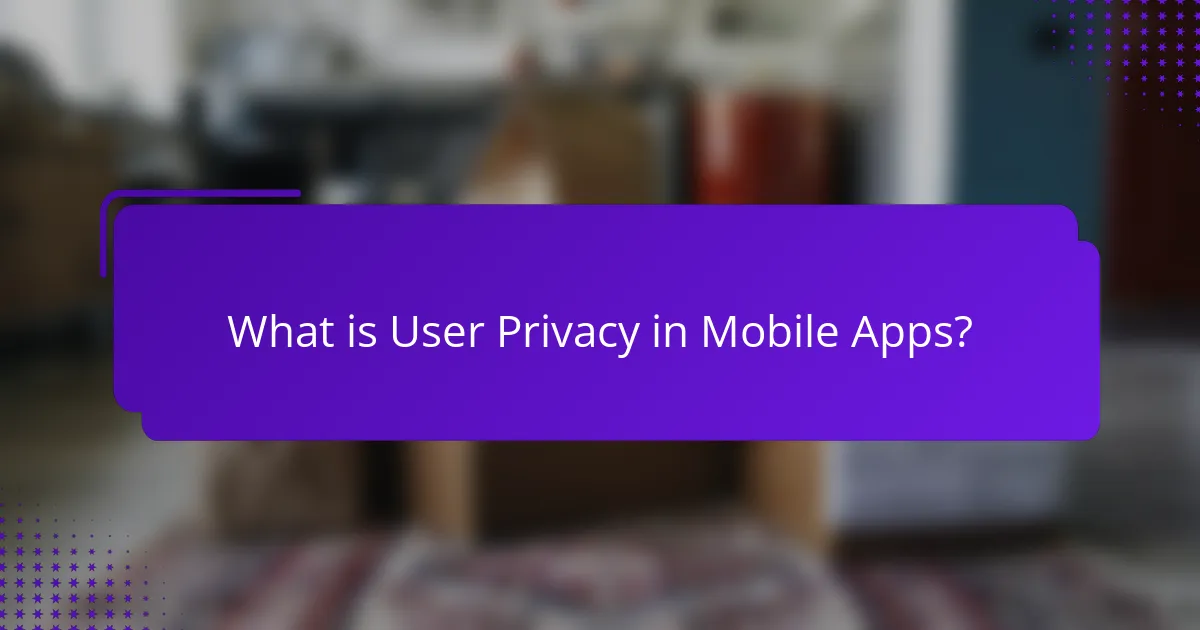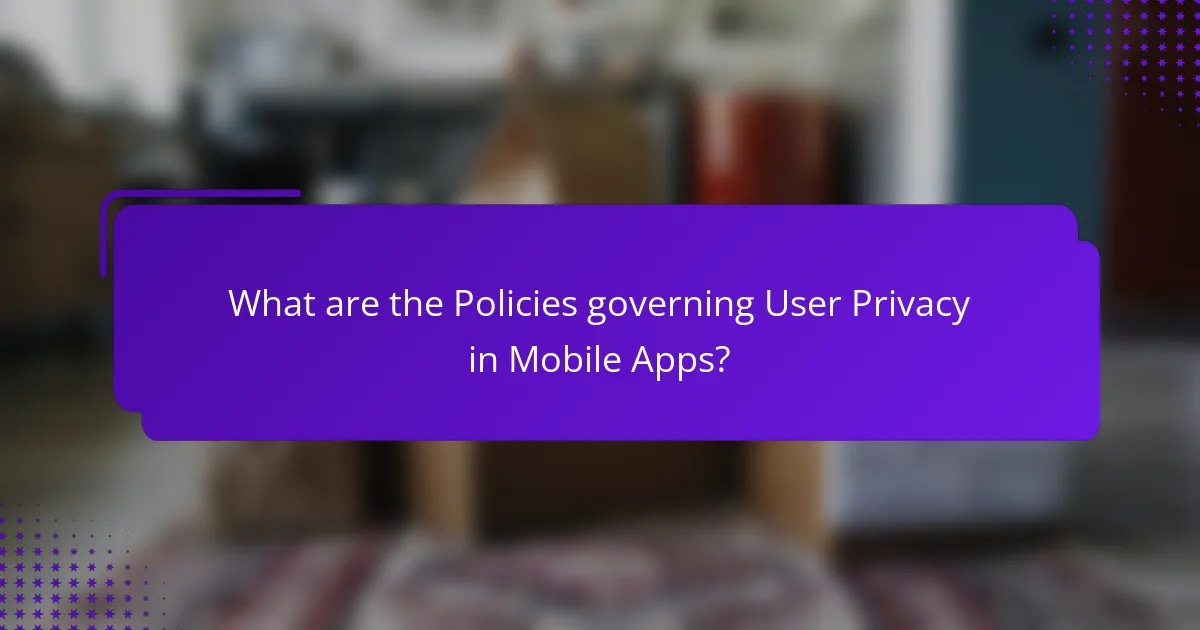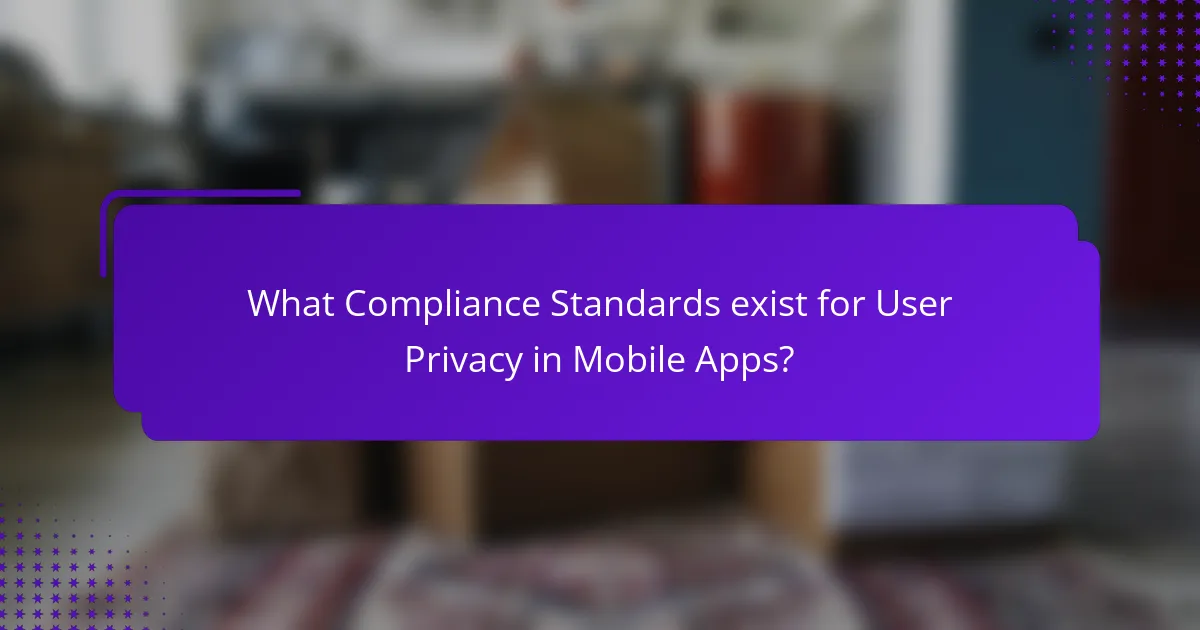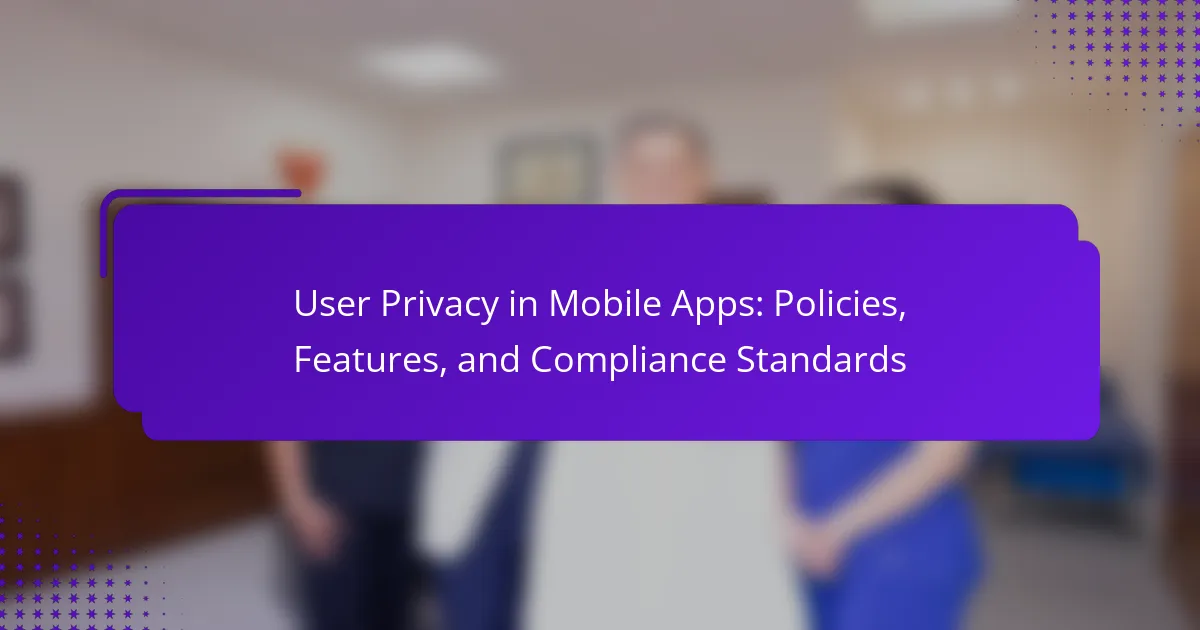User privacy in mobile apps encompasses the protection of personal data collected from users, including information such as location, contacts, and usage patterns. This article examines the critical policies governing user privacy, highlighting key regulations such as the General Data Protection Regulation (GDPR), California Consumer Privacy Act (CCPA), and Children’s Online Privacy Protection Act (COPPA). It discusses the importance of user consent, compliance standards, and the implications of non-compliance, which can lead to legal penalties and diminished user trust. The article also emphasizes the growing concerns among users regarding privacy and the potential for enhanced user experience and loyalty through effective privacy measures.

What is User Privacy in Mobile Apps?
User privacy in mobile apps refers to the protection of personal data collected from users. This includes information such as location, contacts, and usage patterns. Mobile apps often require user consent to access this data. Privacy policies outline how data is collected, used, and shared. Compliance with regulations like GDPR and CCPA is crucial for app developers. Violations can result in legal penalties and loss of user trust. Research shows that 79% of users are concerned about their privacy on mobile apps. Ensuring user privacy can enhance user experience and loyalty.
Why is User Privacy important in Mobile Apps?
User privacy is important in mobile apps to protect sensitive personal information. Mobile apps often collect data such as location, contacts, and usage patterns. Unauthorized access to this data can lead to identity theft and fraud. According to a 2021 survey by Pew Research Center, 81% of Americans feel they have little to no control over their personal information. Additionally, data breaches can damage a company’s reputation and lead to financial losses. Regulations like GDPR and CCPA emphasize the necessity of user privacy. Compliance with these regulations is crucial for legal operation and user trust. Ensuring user privacy fosters a secure environment for app users.
What are the potential risks of ignoring User Privacy?
Ignoring user privacy can lead to significant risks, including data breaches and loss of user trust. Data breaches can expose sensitive personal information, resulting in identity theft and financial loss for users. Loss of user trust can diminish brand reputation and lead to decreased user engagement. Regulatory fines may be imposed for non-compliance with privacy laws, such as GDPR or CCPA. Companies may face legal actions from users whose privacy rights were violated. Additionally, ignoring privacy can result in competitive disadvantages as consumers prefer brands that prioritize their privacy. Overall, the risks of ignoring user privacy can have severe financial and reputational consequences for organizations.
How does User Privacy affect user trust and engagement?
User privacy significantly affects user trust and engagement. When users feel their personal information is secure, they are more likely to trust the platform. A survey by Pew Research Center found that 81% of Americans feel they have little to no control over their personal data. This lack of control can lead to decreased engagement with apps. Conversely, apps that prioritize user privacy often see higher engagement rates. For instance, a study by McKinsey showed that 71% of consumers are more likely to engage with brands that protect their data. Therefore, user privacy is a critical factor in building trust and fostering engagement in mobile applications.
What are the key components of User Privacy in Mobile Apps?
The key components of user privacy in mobile apps include data collection, user consent, data storage, data sharing, and user rights. Data collection refers to the types of personal information that apps gather from users. User consent involves obtaining explicit permission from users before collecting their data. Data storage pertains to how and where user data is securely kept. Data sharing involves disclosing user information to third parties, which must be clearly communicated to users. User rights encompass the ability of users to access, modify, or delete their personal data. These components are essential for ensuring compliance with privacy regulations like GDPR and CCPA, which protect user information and promote transparency.
What types of data are commonly collected by Mobile Apps?
Mobile apps commonly collect personal data, usage data, location data, and device information. Personal data includes user names, email addresses, and phone numbers. Usage data tracks how users interact with the app, such as session duration and features used. Location data provides geographical information, often for location-based services. Device information encompasses details like device type, operating system, and unique identifiers. According to a 2021 survey by the Pew Research Center, 79% of smartphone users are concerned about how their data is being used. This highlights the importance of understanding the types of data collected by mobile apps.
How is data processed and stored in Mobile Apps?
Data in mobile apps is processed and stored through a combination of local and cloud-based methods. Mobile apps often utilize local storage, such as SQLite databases or shared preferences, to save user data on the device. This allows quick access and offline functionality. Data can also be processed in real-time using the app’s logic and algorithms.
For larger datasets or when synchronization is needed, mobile apps often rely on cloud storage solutions. This includes services like Firebase or AWS, which enable remote data access and backup. Data transmission between the app and the cloud typically occurs via secure APIs.
Encryption is a common practice for protecting data both in transit and at rest. This ensures that sensitive information remains secure from unauthorized access. Additionally, mobile operating systems provide built-in security features that enhance data protection.
Compliance with privacy regulations, such as GDPR or CCPA, mandates that apps inform users about data processing practices. This includes obtaining consent before collecting personal data. Overall, effective data processing and storage in mobile apps balance functionality with user privacy and security.

What are the Policies governing User Privacy in Mobile Apps?
Policies governing user privacy in mobile apps include data protection regulations and user consent requirements. Key regulations include the General Data Protection Regulation (GDPR) in Europe and the California Consumer Privacy Act (CCPA) in the United States. GDPR mandates that apps must obtain explicit consent before collecting personal data. CCPA gives users the right to know what personal data is being collected and the ability to request its deletion. These policies aim to enhance user control over personal information. Compliance with these regulations is essential for app developers to avoid legal penalties. Failure to comply can result in fines and loss of user trust.
What are the common User Privacy Policies in Mobile Apps?
Common user privacy policies in mobile apps include data collection transparency, user consent, and data usage disclosures. These policies inform users about the types of data collected, such as location, contacts, and usage patterns. They require apps to obtain user consent before collecting personal information. Additionally, policies outline how user data will be used, shared, and stored. Many apps also provide options for users to access, modify, or delete their data. Compliance with regulations like GDPR and CCPA is often highlighted in these policies. These regulations mandate specific user rights and protections regarding personal data.
How do these policies vary across different regions?
User privacy policies in mobile apps vary significantly across different regions. In the European Union, the General Data Protection Regulation (GDPR) enforces stringent data protection measures. This regulation requires explicit consent from users before collecting personal data. In contrast, the United States has a more fragmented approach, with various state laws like California’s Consumer Privacy Act (CCPA) providing some protections but lacking a comprehensive federal standard.
Countries like Brazil have implemented the General Data Protection Law (LGPD), which shares similarities with the GDPR but has unique provisions tailored to Brazilian citizens. In Asia, regulations differ widely; for instance, China’s Personal Information Protection Law (PIPL) emphasizes strict user consent and data localization.
These regional differences impact how mobile apps handle user data, with varying requirements for transparency, consent, and user rights. Compliance with these diverse regulations is crucial for app developers operating in multiple jurisdictions.
What role do privacy policies play in user consent?
Privacy policies serve as formal agreements that outline how user data is collected, used, and protected. They play a crucial role in obtaining user consent by providing transparency about data practices. Users must be informed about what data is being collected and for what purposes. This information allows users to make informed decisions regarding their consent. According to GDPR, consent must be explicit and informed, which privacy policies facilitate. A well-structured privacy policy can enhance user trust and compliance with legal standards. Inadequate privacy policies may lead to misunderstandings and potential legal issues for companies. Therefore, privacy policies are essential for establishing a clear framework for user consent.
How can users understand and navigate these Policies?
Users can understand and navigate these policies by reviewing the provided documentation. Clear explanations of terms and conditions should be readily available. Users should look for a dedicated section on privacy policies within the app. This section typically outlines data collection, usage, and user rights. Interactive guides or FAQs can further clarify complex information. Users can also contact customer support for specific inquiries. Regular updates to the policies should be communicated effectively to ensure users are informed. Understanding these elements enables users to make informed decisions regarding their privacy.
What should users look for in a Mobile App’s privacy policy?
Users should look for clear information on data collection in a Mobile App’s privacy policy. This includes what data is collected, such as personal information and usage data. Users should also check how their data is used. The policy should specify if data is shared with third parties. Transparency about data retention practices is crucial. Users need to know how long their data is stored. Additionally, the policy should outline user rights regarding their data. This includes the right to access, modify, or delete personal information. Finally, users should look for security measures in place to protect their data. A robust privacy policy helps users make informed decisions about their privacy.
How can users report privacy violations in Mobile Apps?
Users can report privacy violations in mobile apps by utilizing the app’s built-in reporting feature. Many apps provide a dedicated section for users to submit complaints or concerns regarding privacy issues. Users can typically find this option in the settings or help menu of the app.
Additionally, users can contact the app’s support team directly via email or through a contact form on the app’s website. Reporting privacy violations can also be done through platform-specific channels, such as the App Store or Google Play Store.
These platforms often have mechanisms for users to flag apps for privacy concerns. According to a report by the Electronic Frontier Foundation, many users remain unaware of these reporting options. Awareness of these features is essential for effective action against privacy violations.

What Compliance Standards exist for User Privacy in Mobile Apps?
Compliance standards for user privacy in mobile apps include the General Data Protection Regulation (GDPR), California Consumer Privacy Act (CCPA), and Children’s Online Privacy Protection Act (COPPA). GDPR mandates strict user consent for data processing and grants users rights over their data. CCPA provides California residents with rights to access and delete personal information. COPPA protects the privacy of children under 13 by requiring parental consent for data collection. These regulations enforce transparency and user control over personal data in mobile applications.
What are the major Compliance Standards impacting Mobile Apps?
The major compliance standards impacting mobile apps include GDPR, CCPA, and HIPAA. The General Data Protection Regulation (GDPR) applies to apps that handle personal data of EU citizens. It mandates user consent and data protection measures. The California Consumer Privacy Act (CCPA) focuses on consumer rights regarding personal data in California. It requires transparency and the option to opt-out of data selling. The Health Insurance Portability and Accountability Act (HIPAA) governs apps dealing with health information in the U.S. It sets standards for protecting sensitive patient data. Each standard has specific requirements that mobile apps must follow to ensure compliance and protect user privacy.
How do GDPR and CCPA influence Mobile App development?
GDPR and CCPA significantly influence mobile app development by enforcing strict data privacy regulations. These regulations require developers to prioritize user consent and data protection. Under GDPR, apps must obtain explicit consent before processing personal data. CCPA mandates transparency about data collection and gives users the right to access and delete their information. Compliance with these laws necessitates implementing robust privacy policies and user-friendly consent mechanisms. For instance, failure to comply can result in hefty fines, with GDPR penalties reaching up to 4% of annual global revenue. This regulatory landscape compels developers to integrate privacy by design into their app architecture.
What are the consequences of non-compliance with these standards?
Non-compliance with user privacy standards in mobile apps can lead to significant legal and financial repercussions. Companies may face hefty fines imposed by regulatory bodies. For example, violations of the General Data Protection Regulation (GDPR) can result in fines up to €20 million or 4% of annual global turnover, whichever is higher. Additionally, non-compliance can damage a company’s reputation and erode customer trust. This loss of trust can lead to decreased user engagement and revenue. Furthermore, legal actions from affected users can result in costly settlements. These consequences highlight the importance of adhering to privacy standards in mobile app development.
How can Mobile App developers ensure compliance with Privacy Standards?
Mobile app developers can ensure compliance with privacy standards by implementing robust data protection measures. They must conduct thorough assessments of data collection practices. Developers should adhere to regulations like GDPR and CCPA. Transparency with users about data usage is crucial. Clear privacy policies must be provided within the app. Regular audits of data handling processes can help identify compliance gaps. User consent must be obtained before data collection. Developers should also provide users with options to manage their data preferences.
What best practices should developers follow to maintain user privacy?
Developers should implement several best practices to maintain user privacy. First, they must collect only the necessary data. This minimizes exposure in case of a breach. Second, developers should use encryption for data storage and transmission. Encryption protects user data from unauthorized access. Third, they need to provide clear privacy policies. Transparency helps users understand data usage. Fourth, developers should implement user consent mechanisms. This ensures users have control over their data. Fifth, regular security audits are essential. Audits help identify vulnerabilities in the application. Sixth, developers should keep software updated. Updates often include security patches that protect user privacy. Lastly, they should educate users about privacy settings. Informed users can make better choices regarding their data.
What are the best practices for users to protect their privacy in Mobile Apps?
Users can protect their privacy in mobile apps by following several best practices. First, they should review app permissions before installation. This helps to ensure that apps only access necessary data. Second, users should regularly update their apps. Updates often include security patches that protect user data. Third, utilizing strong, unique passwords for each app is essential. Password managers can assist in managing these securely. Fourth, users should enable two-factor authentication where available. This adds an extra layer of security. Fifth, users should be cautious about public Wi-Fi networks. Using a virtual private network (VPN) can secure data transmission. Lastly, users should read privacy policies to understand data usage. This awareness helps them make informed decisions about app usage.
User privacy in mobile apps is the central focus of this article, addressing the protection of personal data such as location, contacts, and usage patterns. The article outlines the importance of user privacy, potential risks of non-compliance with regulations like GDPR and CCPA, and key components of privacy policies, including data collection, user consent, and user rights. It also discusses how user privacy affects trust and engagement, common types of data collected, and best practices for both developers and users to ensure compliance and safeguard personal information. Overall, the article provides a comprehensive overview of the policies, features, and compliance standards essential for maintaining user privacy in mobile applications.
